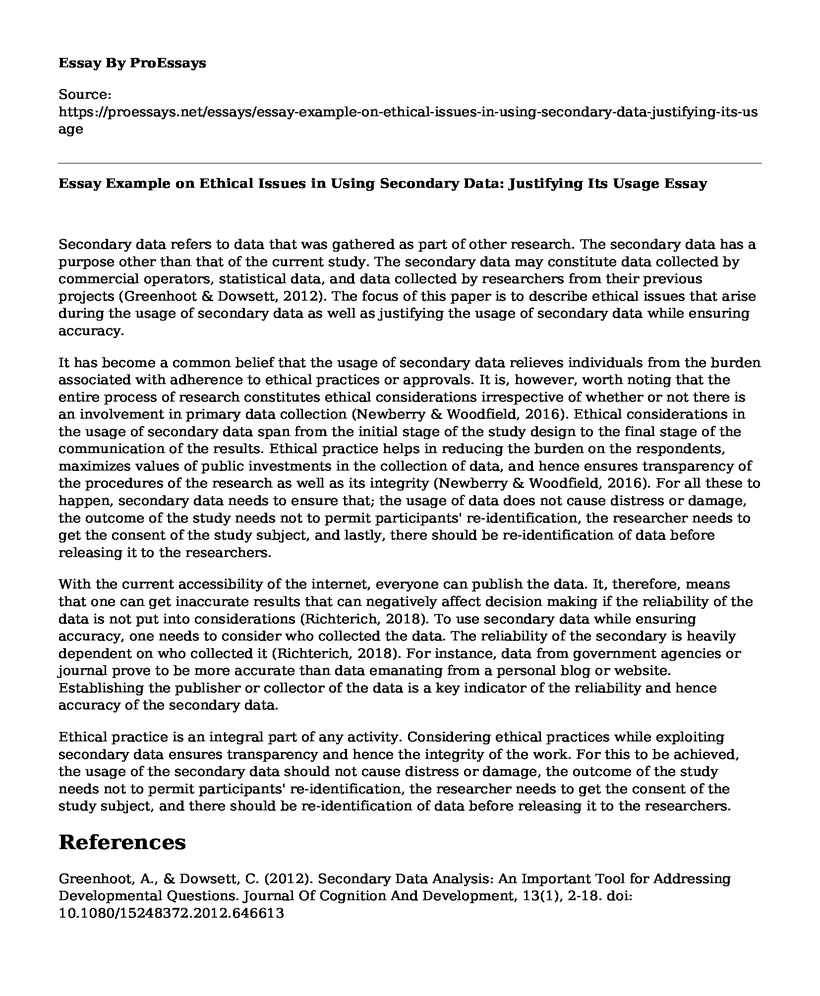Secondary data refers to data that was gathered as part of other research. The secondary data has a purpose other than that of the current study. The secondary data may constitute data collected by commercial operators, statistical data, and data collected by researchers from their previous projects (Greenhoot & Dowsett, 2012). The focus of this paper is to describe ethical issues that arise during the usage of secondary data as well as justifying the usage of secondary data while ensuring accuracy.
It has become a common belief that the usage of secondary data relieves individuals from the burden associated with adherence to ethical practices or approvals. It is, however, worth noting that the entire process of research constitutes ethical considerations irrespective of whether or not there is an involvement in primary data collection (Newberry & Woodfield, 2016). Ethical considerations in the usage of secondary data span from the initial stage of the study design to the final stage of the communication of the results. Ethical practice helps in reducing the burden on the respondents, maximizes values of public investments in the collection of data, and hence ensures transparency of the procedures of the research as well as its integrity (Newberry & Woodfield, 2016). For all these to happen, secondary data needs to ensure that; the usage of data does not cause distress or damage, the outcome of the study needs not to permit participants' re-identification, the researcher needs to get the consent of the study subject, and lastly, there should be re-identification of data before releasing it to the researchers.
With the current accessibility of the internet, everyone can publish the data. It, therefore, means that one can get inaccurate results that can negatively affect decision making if the reliability of the data is not put into considerations (Richterich, 2018). To use secondary data while ensuring accuracy, one needs to consider who collected the data. The reliability of the secondary is heavily dependent on who collected it (Richterich, 2018). For instance, data from government agencies or journal prove to be more accurate than data emanating from a personal blog or website. Establishing the publisher or collector of the data is a key indicator of the reliability and hence accuracy of the secondary data.
Ethical practice is an integral part of any activity. Considering ethical practices while exploiting secondary data ensures transparency and hence the integrity of the work. For this to be achieved, the usage of the secondary data should not cause distress or damage, the outcome of the study needs not to permit participants' re-identification, the researcher needs to get the consent of the study subject, and there should be re-identification of data before releasing it to the researchers.
References
Greenhoot, A., & Dowsett, C. (2012). Secondary Data Analysis: An Important Tool for Addressing Developmental Questions. Journal Of Cognition And Development, 13(1), 2-18. doi: 10.1080/15248372.2012.646613
Newberry, S., & Woodfield, K. (2016). The winter baby (1st ed., p. 564).
Richterich, A. (2018). The Big Data Agenda (2nd ed., p. 546). London: University of Westminster Press.
Cite this page
Essay Example on Ethical Issues in Using Secondary Data: Justifying Its Usage. (2023, Mar 26). Retrieved from https://proessays.net/essays/essay-example-on-ethical-issues-in-using-secondary-data-justifying-its-usage
If you are the original author of this essay and no longer wish to have it published on the ProEssays website, please click below to request its removal:
- The Great Man Theory Essay
- One Card Solution: Economic Analysis of a New Product
- Essay Sample on Elements of Organisation Culture
- Paper Sample on Workplace Bullying: A Culture of Silence in Many US Health Care Settings
- Leadership of Groups: Developing Visionary Leaders - Essay Sample
- Essay Example on Are Leadership Traits Universal or Culturally Bound?
- Interorganizational Conflict vs Intraorganizational Conflict in Organizations - Essay Sample







